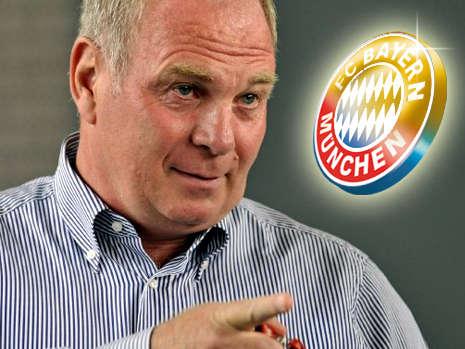
Bayern Munich president Uli Hoeness showing the way for the basketball team. He will have a new vice president to take charge of the basketball team – but will the president himself get his fingers more dirty with hoops. Photo by sportbild
Bayern Munich also reached the Beko BBL playoffs in 2011-12 – their first season in the top flight with their new ambitious basketball program. Stocked with the league’s highest budget at 9 million euros, Bayern have now made public that they are looking for a 10,000-seat arena. The news came out just days before the Munich club will hold elections.
“In the near future we want to call an arena with about 10,000 seats our home,” Bayern managing director Thomas Oehler said at the 8th SPONSORs club manager Summit in Cologne.
“A move is not an acute issue for the BBL club,” said Oehler. “For the next three years, the Audi Dome has to be enough.”
For the 2011-12 season, Bayern moved into the Audi Dome, which was formerly known as Rudi-Sedlmayer-Halle and hosted the basketball at the 1972 Olympics. The arena has a capacity of 6,700, which would be enough to play Eurocup and Euroleague games – if Bayern return to international play.
The Munich daily Abendzeitung reported that Bayern must leave the Audi Dome by 2018 at the latest, stating “structural reasons” as the reason without offering further explanation. The arena needed to undergo massive renovations costing upwards of 3-4 million euros to make it playable. Perhaps some of the permits will run out by then, but it’s unclear.
The AZ also said that Bayern president Uli Hoeness is planning a 5,000 seat facility in Fröttmaning – where the Allianz Arena is located – for FC Bayern’s dozen basketball teams (ranging from 1 Regionalliga to youth. It’s unclear if Bayern Munich’s professional team would use that facility as a practice gym. The Beko BBL currently is encouraging its teams to have their own practice gym and the league is considering making it a requirement for a license.
A new arena would also likely help Bayern add more income. Oehler said the club generates about 23 percent of its revenue through ticket sales. The main source of income for Bayern is sponsoring, making up about 70 percent of total revenues.
Oehler’s statements came about a week before Munich’s elections to the Executive Committee at the annual general meeting on November 15 – at the Audi Dome. Current vice presidents Fritz Scherer and Bernd Rauch are stepping down from their positions and Karl Hopfner and Rudolf Schels are expected to be elected as the new vice presidents with Hoeness himself up for re-election as well.
The finance expert Hopfner, who will retires as the Bayern Munich AG deputy chairman on 31 December, will likely be the successor to Scherer as senior vice president, moving into a voluntary function after 30 years on the full-time staff.
Schels, who would take over as second vice president, is a 63-year-old entrepreneur from Regensburg. He has been a member for many years and also sits on the Advisory Board and will be given responsibility of the basketball department, which was Rauch’s specialty.
The 69-year-old Rauch joined the club in 1979 and became vice president in 2002. An engineer by trade, he was a key figure in the planning and construction of the Allianz Arena and the redevelopment of the Audi Dome.
It’s unclear what Schels’ taking over from Rauch will mean for the basketball team and department. But within seven weeks, the Munich basketball project will have lost two of its biggest parts. Head coach Dirk Bauermann – the man Hoeness originally wanted as leader on the sidelines – was fired just six days before the start of the season on September 27. And Rauch was the father of the project who initially convinced Hoeness to start up the project.
There is speculation about what Rauch will do afterwards, with some saying he will be a leading figure in the construction of the new 10,000-seat basketball facility.
But what role will Schels have? Especially when one considers that Hoeness appears ready to get his hands dirty with the basketball team after seeing how well the football team is running.
When he appeared on the German sport channel Sport1 in early October to discuss the Bauermann firing, Hoeness let out a grin when talking about finally dealing more with the basketball department after more or less leaving it run itself for the first two seasons.
“Now it’s just getting fun. When things run well, then you just let them roll. Now I have to say I am really called upon for the first time from a leadership position. I really didn’t poke around much the first two years, but now I see that I am needed,” said Hoeness.
